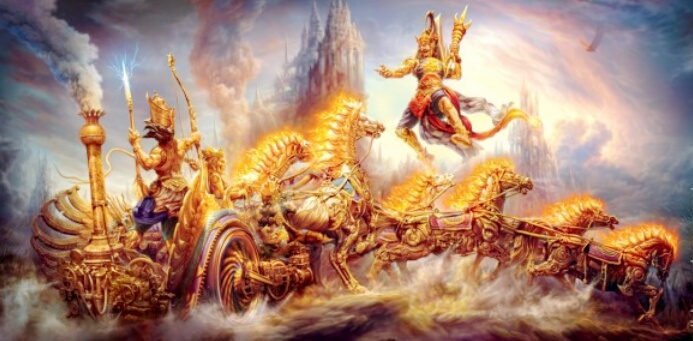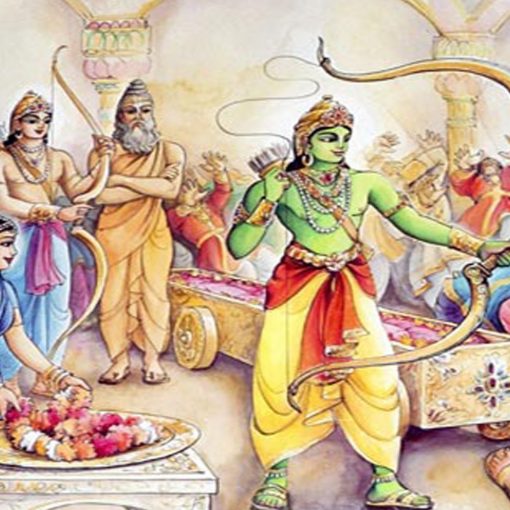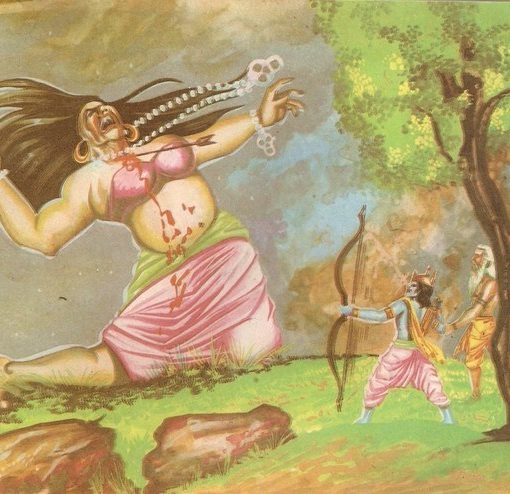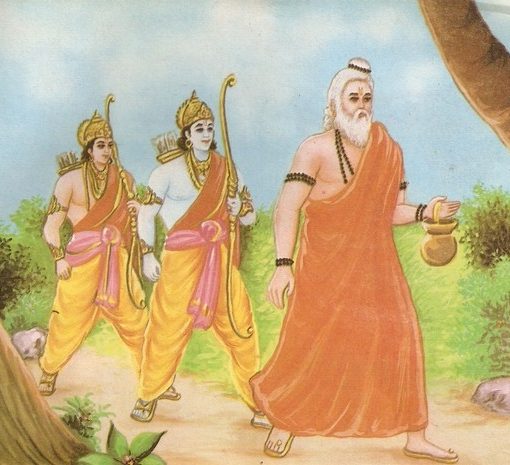As Rāvaṇa flew in the Pushpaka he suddenly saw ahead of him the celestial seer, Nārada, shining brightly and holding his tamboura. The seer plucked the strings gently, singing the praises of Viṣṇu. Rāvaṇa had met him many times before and was pleased to see him. The Rākṣasa usually had little time for <it+>sages, especially devotees of Viṣṇu. He preferred to kill and eat them rather than speak with them. The <it+>ṛṣis and seers generally favored the gods, but Nārada was different. He would often give Rāvaṇa good advice and seemed to be his well wisher. Rāvaṇa raised a hand in salute to the sage.
The seer came before Rāvaṇa and greeted him. Nārada could travel freely anywhere in the universe. It was even said that he could leave the material worlds and journey to Vaikuntha, the spiritual abode of the Lord himself, which knows no decay and is free of all suffering. Nārada smiled at Rāvaṇa. His large eyes were like two shining sapphires. On his head his coiled golden hair was held in place by a jeweled silver band. Clad in the soft skin of a black renku deer, Nārada stood in the air in front of Rāvaṇa, who invited him onto the chariot. Sitting cross-legged on a golden seat next to the demon, the seer began to address him in gentle and pleasing tones.
“Why are you harassing this world of humans, O valiant one? It is already in the grip of death. These people do not deserve to be attacked by you, Rāvaṇa, who cannot be overcome by even the entire heavenly host united together. Who would destroy people who are wracked by numerous anxieties, surrounded by endless calamities, and are subject to old age and hundreds of diseases?”
Nārada told Rāvaṇa that everyone in the material world would in time go to the abode of Yamarāja, the great lord of death. There was no need for Rāvaṇa to kill them. Death conquers all. Even the gods would eventually succumb to death. If Rāvaṇa should conquer Yamarāja the entire universe would be conquered.
The sage knew that Rāvaṇa could not overpower Yamarāja. But he wanted to distract the demon from his evil aim of killing more people and overthrowing the gods. He also wanted the Rākṣasa to greatly increase his sinful actions by assailing the god of Death. Rāvaṇa would thus create for himself a karmic destiny which would soon result in his own destruction.
The demon pondered Nārada’s suggestion. This sounded interesting. He liked the idea of fighting with the immensely powerful Yamarāja. Perhaps this would be a battle worthy of him. And if Death himself were slain then the whole universal order would be cast into utter chaos! That appealed to Rāvaṇa, who wanted to assert himself over any and all powers in the universe. He nodded slowly at Nārada, who sat smiling at him. Rāvaṇa told the sage he would leave immediately for Death’s abode. As Nārada rose up into the sky, playing upon his tamboura, Rāvaṇa began heading towards the domain of Yamarāja, the god of justice.
As Rāvaṇa approached the ethereal region known as Yamaloka, he saw everywhere living beings reaping the fruits of their actions. He also saw the millions of soldiers and servants of Yamarāja, known as the Yamadutas. They appeared fierce and unapproachable. Their bodies were powerful but hideously deformed, covered all over with black hairs that stood erect. In their hands they held nooses and terrible weapons. Their faces were contorted into frightful expressions and they yelled and shrieked in dissonant tones. Moving swiftly, they struck and tortured people who were running in all directions.
Fearful screams and cries resounded everywhere in that dark and desolate place. Rāvaṇa saw in hundreds and thousands people being eaten up by fierce dogs, consumed by fires, or being hurled into vats of boiling oil by the Yamadutas. Other unrighteous men and women were running here and there on burning sands, being pursued by Yamadutas holding lances and tridents. Some were being dragged through trees with leaves like steel razors that shredded their bodies. Howling in terrible pain they would fall to the ground, but their bodies would again become whole. They would then leap up and race off, only to be quickly caught by the Yamadutas and put through the same suffering again.
Rāvaṇa witnessed innumerable kinds of punishment being meted out to sinful souls. Searching for Yamarāja, he coursed on rapidly in the Pushpaka. In other parts of that mystical and indescribable region, Rāvaṇa saw people enjoying celestial delights by virtue of their own good deeds. It seemed as though they were situated in a separate dimension of space and time. Beautiful heavenly landscapes stretched out into the distance. Large shining mansions stood next to clear blue lakes. Young men and women with highly attractive forms were dressed in golden garments and ornaments, embracing one another and laughing. Excellent food and drink was laid out on gold and silver tables. Musicians played and young girls danced. Rāvaṇa saw countless people intoxicated with pleasure and entirely oblivious to the scenes of suffering elsewhere.
Leaving behind that glowing region of happiness, Rāvaṇa continued deeply into Yamaloka. He crossed over the broad Vaitarani river, which flowed with blood and excrement, and came to another dark terrain where countless Yamadutas were relentlessly pursuing wicked persons. The terrible cackles of the Yamadutas echoed there, along with the howls of jackals and wolves. Everywhere stood people who appeared emaciated and pale, seized with unbearable thirst and crying out for water.
Descending from his chariot, Rāvaṇa began to beat back the Yamadutas, freeing the people they were punishing. He felt no compassion for the pain of others, but he calculated that by oppressing the Yamadutas he would cause Yamarāja to appear. As the demon freed many thousands of wretched persons from their tormentors, he was suddenly attacked by a massed force of Yamadutas. They assailed Rāvaṇa with spears, iron bars, steel clubs, pikes, javelins and maces. They rose up and began demolishing the seats, daises, pillars and houses on the Pushpaka. But the indestructible chariot was immediately recreated by the power of Brahmā, by whom it had first been fashioned.
Rāvaṇa’s Rākṣasa forces fought back against the Yamadutas. Millions upon millions of servants of Yamarāja advanced in great waves. They rained down an unlimited number of arrows and other fierce weapons upon Rāvaṇa and his followers. The Rākṣasas engaged with the Yamadutas, sending up their terrible war cries. The clash of weapons and the shouts of the warriors sounded like the roaring ocean tossed by a storm.
Leaving off the other Rākṣasas, the Yamadutas concentrated upon Rāvaṇa. Covered all over with their arrows and bleeding profusely, the demon king appeared like a great mountain giving forth streams of red lava. Using his knowledge of mystical weapons, the Rākṣasa returned volleys of arrows, spears, maces, rocks and huge trees. This fearful and deadly shower fell upon the forces of Yamarāja who stood in front of Rāvaṇa.
By whirling their maces and lances the Yamadutas repelled all Rāvaṇa’s missiles and surrounded him in thousands. They appeared like a mass of carnivorous ants around a large black beetle. Rāvaṇa became completely covered by darts and lances piercing every part of his body. He roared in anger and pain, quickly rising upwards from out of the midst of his assailants.
Descending to the ground he held his bow and placed upon it a blazing arrow. The demon invoked the power of Śiva, imbuing the arrow with the divine force of that immortal god. As the weapon was released a sheet of fire rushed across the ground, consuming Yamarāja’s forces. Enormous orange and white flames leapt in all directions, burning the Yamadutas’ bodies to ashes. The ground itself became molten and the forces of Yamarāja fell back in a confused mass.
In the flames’ wake came innumerable ghostly followers of Śiva, filling the earth and sky with their terrifying forms. They rushed about the battlefield striking fear into the Yamadutas’ hearts. By the power of Śiva’s weapon, waves of fearsome carnivorous beasts sprang up from the ground, howling horribly and tearing at the Yamadutas.
Rāvaṇa sent up a victory cry, making the ground shake. Hearing that shout, Yamarāja, seated in his palace, could understand that Rāvaṇa was overpowering his forces. He ordered his chariot to be fetched and quickly mounted it. Yamarāja stood in his stupendous chariot with a lance and mace in his hands. Angered, the great god burned with a glaring radiance. By his side stood the personified form of Kaladanda, the infallible rod of Death, his body a brilliant black and his eyes blazing like two red fires. On the other side of Yamarāja stood the very Time Spirit himself, the destroyer of the worlds, fearful in appearance. Standing together those three deities could not be countenanced. On all four sides of the chariot, which looked like a dark mountain, hung the frightful nooses of Death.
Drawn by a thousand red and black steeds shining with a bright luster, and having a thousand great wheels, the celestial chariot advanced with a terrible noise. Seeing that god moving off in anger, all the denizens of heaven trembled.
In an instant Yamarāja ‘s chariot arrived at the spot where Rāvaṇa stood roaring. Rāvaṇa’s followers immediately fled in all directions simply upon seeing that awful chariot. Some of them fell unconscious on the spot. But Rāvaṇa himself was not afraid. Seeing his awful adversary he felt overjoyed, anticipating the fight. The demon stood firm as Yamarāja hurled at him many blazing javelins and iron clubs. They struck Rāvaṇa with tremendous force, piercing him and causing streams of blood to flow from his body.
Rāvaṇa raised his bow to counter Yamarāja’s attack. Using sorcery, he fired thousands of straight-flying arrows imbued with the force of a thunderbolt. Those arrows struck Yamarāja all over his body, but the god remained unmoved. Again and again Rāvaṇa fired off his arrows and darts, charging them with celestial power. He struck all three deities with his fiery weapons, but they stood firm. Yamarāja sent back at the demon countless barbed lances which struck him violently on the breast. Stunned by those irresistible weapons, Rāvaṇa fell unconscious to the ground. Yamarāja, observing the rules of fair combat, did not further attack his overpowered enemy.
After some time Rāvaṇa came back to his senses and saw Yamarāja still stationed before him. He contemplated his next move. This was indeed a formidable opponent. Rarely was the demon extended in a fight. Rāvaṇa rallied himself and stretched his bow to full length, releasing celestial arrows which filled the sky. They fell upon Yamarāja like fiery serpents. Being assailed by those arrows, and bleeding profusely, Yamarāja roared in anger. As he opened his mouth, fire covered by billows of smoke issued forth. The whole region was brilliantly illuminated by that fire, as if the sun itself had risen in that ever-dark place.
Witnessing the astonishing battle between Yamarāja and the Rākṣasa, the gods assembled above them. They feared that the dissolution of all the worlds was imminent. Yamarāja’s anger would surely annihilate the entire universe.
Rāvaṇa continuously sent his furious weapons towards the three gods. Death personified, highly enraged by Rāvaṇa, then spoke to Yamarāja. “My lord, do not exert yourself further. Let me remain alone here with this Rākṣasa. I shall make short work of him. None in the past, no matter how powerful, have been able to overcome me. Every god, <it+>ṛṣi and demon has succumbed to my power. Indeed, all created beings must surely submit to me. There is no doubt about this, therefore you need not bother yourself with this wretch any longer. Leave him to me.”
Yamarāja had become infuriated by Rāvaṇa’s insolence. He felt insulted and he told Death to stand back, for he personally would destroy the demon. The god lifted up his mace and gazed upon Rāvaṇa. As it was raised, that mace threw off a halo of blazing fire. Yamarāja held it in his hand like the globe of the sun and he fixed his red eyes on the demon. Just as he was about to release the mace to destroy Rāvaṇa, Brahmā appeared before him. He was seen and heard only by Yamarāja as he spoke to the angry god.
“O immeasurably powerful one, this Rākṣasa is not to be killed by you at this time. Indeed I have conferred upon him a boon that he cannot be slain except by a human. This cannot be falsified, lest the order of the universe be cast into chaos. Therefore hold back your mace. Rāvaṇa is not yet destined to die. If you release your infallible mace upon this demon, it will result in the death of all other created beings.”
Long ago Rāvaṇa had pleased Brahmā by performing difficult asceticism and had won from the god a boon. Brahmā had granted Rāvaṇa immunity from being slain by any beings, except for humans or animals, whom Rāvaṇa utterly disregarded.
Hearing that command of Brahmā, the chief of the gods, Yamarāja lowered his mace. Realising that nothing could be accomplished by him in that battle, he then and there disappeared from Rāvaṇa’s sight. When he saw Yamarāja depart, the Rākṣasa considered himself victorious and roared in joy. Now he was surely the most powerful being in the universe. What was there left to prove? Even the great lord of death had run away from him.
Rāvaṇa looked around and saw that the slain Yamadutas had been brought back to life by Yamarāja’s power. Ignoring Rāvaṇa they continued their grisly task of meting out punishment. Rāvaṇa felt he had no further purpose to achieve in Yamaloka. He had established his supremacy and that was all he desired. It was time to return to Lanka, his golden city. Getting aboard the Pushpaka he left that region, followed by his forces, and flew to the north, heading again for the earth planet where Lanka was situated.





